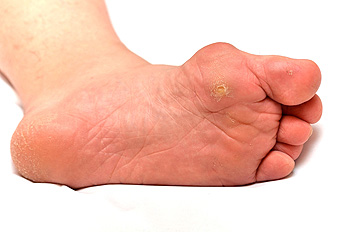

Corns, calluses, and plantar warts are common foot conditions, but they have distinct causes, symptoms, and treatments. Corns are thickened areas of skin that develop on pressure points, often on the toes or soles, due to friction from wearing ill-fitting shoes or repetitive pressure. They can be painful, especially when walking. Plantar warts are caused by a viral infection, the human papillomavirus, or HPV, and typically appear as rough, raised growths on the bottom of the feet. Plantar warts are contagious and may cause discomfort when pressure is applied. Treatment for a plantar wart may involve freezing the wart with liquid nitrogen, laser treatments, or minor surgery to remove it. To treat a corn, start by addressing the cause of friction and pressure, such as wearing properly fitting shoes and using inserts or pads for cushioning. If a painful corn persists it can be safely removed by a podiatrist. If you have either of these ailments, it is suggested that you schedule an appointment with a podiatrist for a diagnosis and appropriate treatment.
Corns can make walking very painful and should be treated immediately. If you have questions regarding your feet and ankles, contact one of our podiatrists of Grand Blanc Family Footcare. Our doctors will treat your foot and ankle needs.
Corns: What Are They? And How Do You Get Rid of Them?
Corns are thickened areas on the skin that can become painful. They are caused by excessive pressure and friction on the skin. Corns press into the deeper layers of the skin and are usually round in shape.
Ways to Prevent Corns
There are many ways to get rid of painful corns such as:
Treating Corns
Although most corns slowly disappear when the friction or pressure stops, this isn’t always the case. Consult with your podiatrist to determine the best treatment option for your case of corns.
If you have any questions please feel free to contact our office located in Grand Blanc, MI . We offer the newest diagnostic and treatment technologies for all your foot and ankle needs.